THIRTY years ago this Wednesday on a cool winter morning in Brisbane, a seemingly simple transaction between two men made history.
It was the moment royal commissioner Tony Fitzgerald, QC, handed over his final report to then Queensland Premier Mike Ahern.
Fitzgerald had spent two long and arduous years presiding over an inquiry into vast police and political corruption in Queensland.
What was expected to take six weeks had evolved into a seemingly endless journey into the Sunshine State’s dark past. Fitzgerald would later remark that his inquiry could have gone on for 100 years.
But the exchange of the final report was in itself a watershed moment.
The Queensland that had existed when Fitzgerald opened his inquiry in 1987, following some extraordinary media reports by The Courier-Mail and the ABC’s Four Corners, was a different place when Fitzgerald drew the curtain on his inquiry two years later.
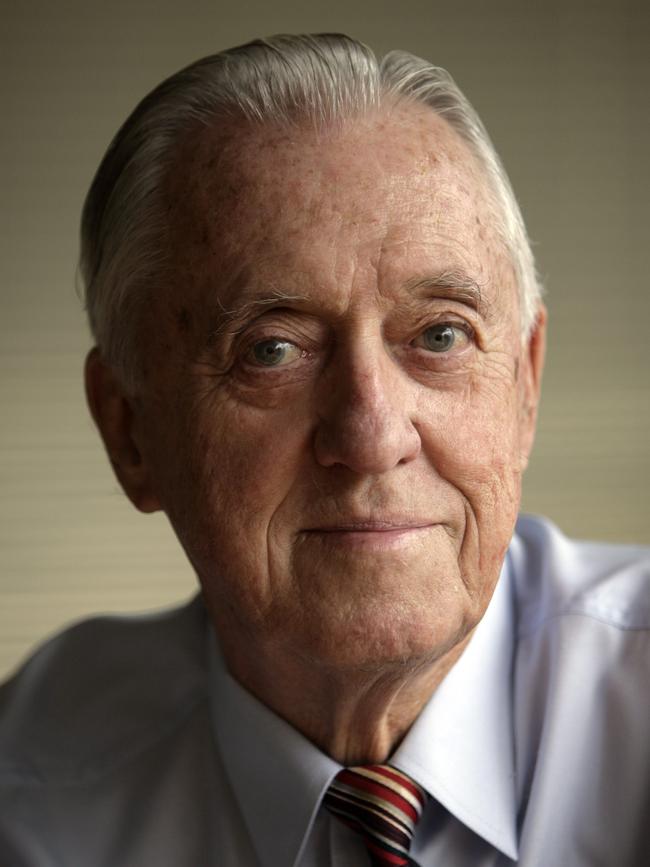
The biggest scalp of the inquiry was undoubtedly former Knight of the Realm and Queensland police commissioner Terence Murray Lewis.
While many corrupt police and some politicians were charged out of Fitzgerald’s findings, it was Lewis who had the biggest fall from grace.
As a result, Lewis reserved a special enmity for Tony Fitzgerald, blaming the commissioner for his fate, and everything else that befell him.
Lewis lost everything, including his recently-constructed mansion on exclusive Garfield Drive in Paddington, and would go to jail for a decade.
In 2010 I began more than three years of interviews with Lewis, who believed it was time to “tell my story”.
We met at homes he lived in during that period in Stafford in the city’s north and Keperra, northwest of the Brisbane CBD.
Lewis was convivial, well-mannered, at times extremely funny, polite, and an engaging interview subject.
His memory, even then at 82, was phenomenal.
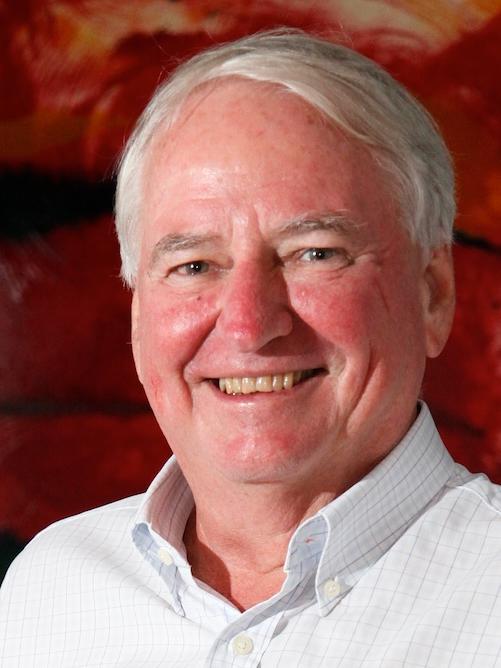
It was only when discussing Fitzgerald and his inquiry, however, that Lewis lost his courtesy. And in the dozens of interviews we logged, very rarely did the session conclude without mention of Fitzgerald.
Lewis, to this day, maintains his total innocence.
He blames Fitzgerald. An unfair trial. And his former friend and Licensing
Branch officer, Jack “The Bagman” Herbert.
Herbert had secured immunity from prosecution during the inquiry, in exchange for the true story of corruption in ranks of the Queensland police, and he dumped on Lewis with abandon.
The following never-before published extracts from Lewis’ interviews with me focus on his singular view of the Fitzgerald Inquiry, the weaknesses and unfairness he believes he
identified, and the methods by which he became the “scapegoat” for generations of corruption.
THE GOSSIP
Lewis insists that the inquiry hearings and evidence from hundreds of witnesses was distorted by the admission of “gossip”.
“(There are newspaper articles) … saying that judges, High Court judges and others say you should never have a Royal Commission or Commission of Inquiry where you accept gossip and rumour and name people until they have an opportunity to say hey, what proof have you got?” says Lewis.
“ … that’s what Fitzgerald did - gossip, rumour and innuendo. He said that’s what we want to hear.
“…they all jumped on the bandwagon…when Fitzgerald was prepared to accept anything…he accepts the gossip, rumour and innuendo. No inquiries ever accepted that, none of them ever.”
THE FIX
Lewis believes the fix was in against him courtesy of some Machiavellian behaviour from two then government ministers, former deputy premier Bill Gunn, and Police Minister Max Hodges.
Gunn called the inquiry the day after Chris Masters’ extraordinary Four Corners report, “The Moonlight State”, went to air In May, 1987. Premier Joh Bjelke-Petersen was overseas at the time and Gunn was acting premier.
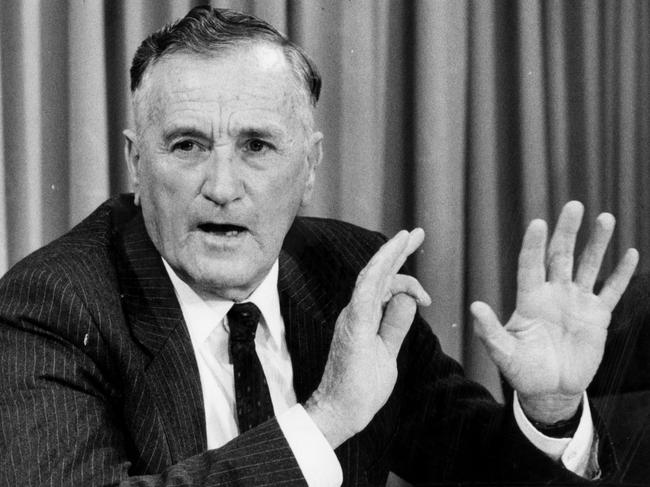
Lewis believes the Cabinet submission to establish the royal commission was put before Cabinet at the last minute, minimising debate.
“Hodges had put through a lot of promotions and transfers and the smart thing was, apparently if you were a smart minister and you wanted to put it over your mates … as you know most Cabinet submissions they had to have them in on a Friday and a copy of your submission went to the ministers and then on the Monday they met and debated them,” Lewis says.
“But you could put in … a late submission … you could just take it along to the Cabinet meeting and put it in. In fact, that’s what Gunn did with the Fitzgerald thing.”
THE RED-HOT LABOR MAN
Lewis says in the lead up to the inquiry proper, he had numerous discussions with his good friend, the former Queensland Director of Prosecutions, Des Sturgess, about the choice of commissioner.
Sturgess indicated that he knew of Tony Fitzgerald’s work, and that he’d be right for the job.
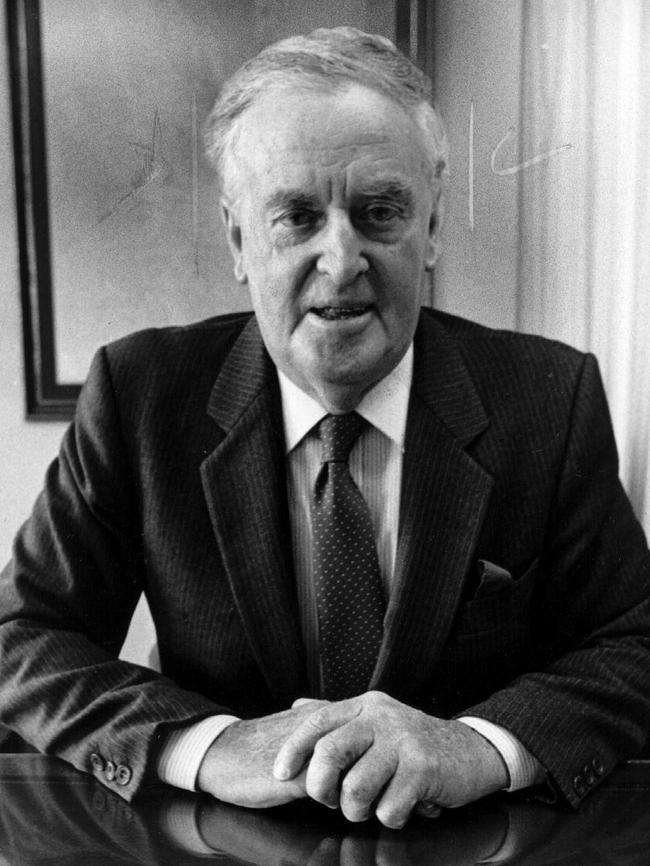
But Lewis got another call, from a confidante who belonged to a “very famous legal family” that he refuses to name.
“He begged me not to use his name, which I didn’t,” Lewis says.
“He rang me (after Fitzgerald was appointed) and said he knew Fitzgerald personally and that he did opinions for the Labor Party.
“He said, ‘I know he’s a red-hot Labour supporter, I know he hates Joh and his ambition will be to unseat this government … Joh … is absolutely mad if he leaves him to run this commission. He’ll get Joh’.”
Lewis says he got straight into his car and headed out to Joh’s property, Bethany, outside Kingaroy, 210km northwest of Brisbane.
Lewis says when he confronted Bjelke-Petersen with the issue of Fitzgerald, the Premier seemed distracted.
Bjelke-Petersen was, at the time, embroiled in his failed Joh for PM campaign.
“I’m not sure if it went in this ear and out the other … he was thinking of bloody Canberra,” Lewis says.
“Joh lost track of things….”
THE DIARIES
One of Lewis’ most persistent bugbears about the inquiry was the making public of his voluminous diaries as police commissioner, from November 1976 until he was suspended from duties during the Inquiry, thanks to evidence about police corruption before Fitzgerald.
Lewis always maintained that as commissioner he was not required professionally to keep a diary, but being a compulsive diarist he did anyway.
He says he freely relinquished his diaries to the commission on the understanding that they would be kept confidential, given the personal nature of some of the notations.
In the end, the diaries contributed to his downfall.
“I bundled them up and gave them to a lawyer bloke and said look there they are … they said they just wanted them all to refer to and that sort of thing,” recalls Lewis.
“I never ever thought the rotten bastards would never return them to me but more importantly, would release them publicly.
“ … (the diaries) weren’t just an official diary about my work, I put my family things in it. I wasn’t going to keep two lots of diaries and if (wife) Hazel was sick or something that was in, all that stuff was in my diaries.
“When the inquiry was still going, and on my 60th birthday what did Fitzgerald do? Release my diaries. He told me the day before he was going to release my diaries to the media and the public the next day.
“And I objected of course and (Fitzgerald) said, if overnight you want to go through them all and … it was impossible. Absolutely physically and mentally impossible. So they released them the next day and the media had a ball.”
In reality, Lewis’ diaries provided an integral road map of Lewis’ movements, meetings, contacts and thoughts. They also exposed, among other things, a conspicuous lack of separation of powers between the police force and government.
THE MEDIA
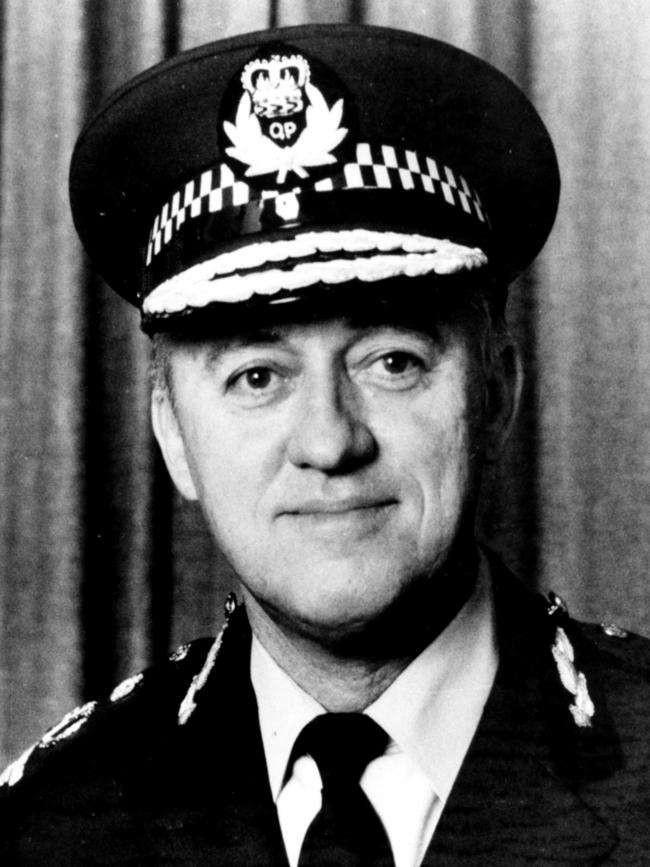
Lewis maintains that the inquiry, given its duration of two years and the expense involved, needed to secure a high-profile target at the end.
If it wasn’t Joh Bjelke-Petersen, he theorised, then it would be him.
“Fitzgerald and the media created a whole atmosphere of suspicion and fear and, as you’ll see in the Fitzgerald transcripts somewhere, Fitzgerald said that if anybody didn’t agree with him they were supporting the forces of evil,” Lewis says.
“If you spoke up other than what they were saying you were a crook, obviously. They bluffed people and they threatened people.”
Lewis says despite everything, the Fitzgerald Inquiry still didn’t go far enough.
“They never tried, they didn’t try,” he says. “It seems to me that Fitzgerald didn’t want to take on anything that was too hard.
“They never got into drugs which was the big thing then. And all they got on to was frigging SP betting, prostitution, which there’s never been more prostitution than there is now, and what was the other?
“Bloody little gambling joints in the Valley. Well now we’ve got massive casinos. They didn’t get on to anything hard and they had massive staff …”
AFTERMATH
Lewis says he has several regrets about the inquiry, not the least that he was convicted of official corruption and sentenced to jail.
“I’ve never forgiven myself for co-operating with the Fitzgerald inquiry like I did, thinking they were honourable legal people,” he adds.
“It makes me … I suppose in a way I’m nearly past the depressing stage … (but) I’ve lost everything that was of any great value to me, and particularly Hazel of course. And … it makes me angry to think what they got away with and how they were supported in it, the huge amount of money they made, the rewards they got for it.
“The rewards that bloody Fitzgerald got were just remarkable.”
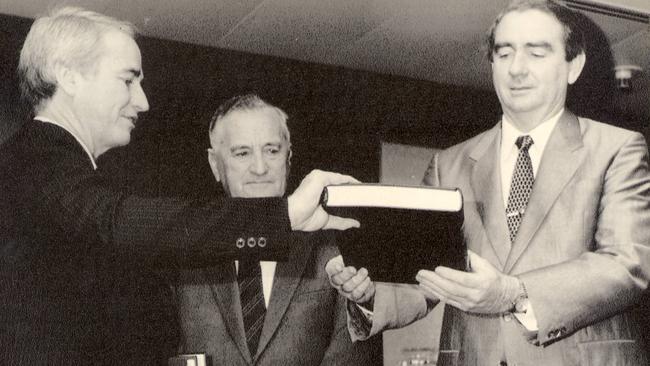
Lewis, 91, currently lives with one of his children in Brisbane’s inner-north-west.
He maintains his complete innocence despite a verdict of guilty by a jury of his peers at the end of his trial.
His claims of an unfair trial, too, wither with any serious scrutiny of the trial proceedings presided over by Justice Anthony Healy.
Healy ruled out a minimum of evidence and made demonstrable efforts to ensure Lewis got a fair trial.
As for Fitzgerald, his name is now a by-word for due diligence and honesty.
His inquiry was, and remains, a template for royal commissions.
He will go down as one of the most important figures in Queensland history in the past century.

Add your comment to this story
To join the conversation, please log in. Don't have an account? Register
Join the conversation, you are commenting as Logout
The lie that cost underworld figure his life
When Carl Williams lied about Michael Marshall’s involvement in a contract killing, he as good as signed the hotdog salesman’s death warrant.
Lunchtime jewel heist which rocked Sydney’s CBD
In what was considered the biggest jewellery heist of the first half of the 20th century, in 1947 a thief managed to steal jewels worth about $600k today. But his glory was short-lived.